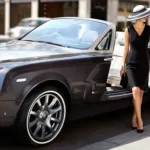With How to Kill Your Family hitting shelves this summer, Bella sat down with MC to talk crime fiction, writing female psychopaths and the role reading plays in her life…
You would have to be living under a rock not to have heard of Bella Mackie, with her acclaimed book, Jog On, getting many of us through lockdown (this writer included).
It is her fantastic new crime novel that has catapulted Bella back into the spotlight however, with How to Kill Your Family hitting shelves earlier this summer.
Think Killing Eve meets Apple Tree Yard – packed with dark wit and centred around a fashionable Villanelle-type anti-hero that all women will root for.
In short this book is a must-read, and in my opinion an important one, illustrating how the system is rigged against women and featuring references to the manosphere.
As Bella explained herself: ‘This book is all about men having power over women and the system being rigged to make men win. So, while I do want it to be funny, I also want women to read it and feel that rage.’
Features Editor Jenny Proudfoot sat down with the wonderful Bella Mackie to talk How to Kill Your Family, writing female psychopaths and the solace of reading.
Was it a daunting move from non-fiction to fiction?
Definitely. Jog On was an unexpected success. They hadn’t ordered that many copies of it, I couldn’t find it in bookshops and then it suddenly did unexpectedly well. I think after that publishers were like ‘Oh what more could you write?’ and I had offers to do non-fiction projects that were quite similar. I just thought another non-fiction book might end up being a bit of a pale imitation and that I might not do it justice. But I thought if they like me and I have proved that I can write a book and hand it in on deadline, then maybe this is my shot to convince someone to buy some fiction off me. It was really daunting because I didn’t know how to write fiction – I’ve never done it before and I had no idea how to structure a novel. But I just thought that if there’s a time and an opportunity, it’s now so I’ve got to try.
What gave you the idea for How to Kill Your Family?
My dad used to read me a lot of true crime when I was growing up, and I’m talking when I was 8 or 9 years old. It’s actually so inappropriate for an adult to think that was a good idea and I’m sure that’s partly why I’m so anxious as a grown up. As I got older I think I found myself quite turned off by the grizzly way that female victims are reported on. So I stopped reading true crime and I started reading lots of Agatha Christie, Dorothy L Sayers and all of these brilliantly intricately plotted things instead. I was always obsessed with motives – why people kill people – and for me, I think the best reason for murder is vengeance. So, I always thought at the back of my mind, if I could write a crime novel, I would want it to be a quaint and kind of funny story about murder and vengeance with a female protagonist.
Was it a more relaxing writing experience not having to recount your own life?
I didn’t mind the recounting my own life so much as I just had this desperate need to get the facts right for Jog On. With mental health you obviously feel a huge responsibility to get it right and I didn’t want to misrepresent anything or offer bad advice. I also wanted it to be inclusive and not just about me. To do that justice took a lot of research which I found quite daunting, whereas with this I could basically just write from my head. At first it felt really unnerving – I was like, ‘Is this ok? Do I have to research this?’ But after a while, it actually felt like a bit of a weight off and much more freeing than non-fiction where you’ve got to get it right.
Did How To Kill Your Family involve any research?
My book is not a hyper realistic depiction of anything so I had a lot of artistic licence and was free to write something that I thought would be fun more than anything else. But at the same time, as a reader myself I know that it can be an immediate turn off if a book feels completely unrealistic. I wanted to keep it within the realms of reality so I researched all the ways that everyone gets murdered to see what the feasibility of it all was. I was looking into smart houses and sex clubs – things like that, so the research was a bit more fun than with Jog On. And it was all much more about ensuring that a reader could go along with it, rather than having to get the facts right to avoid doing an injustice to people with mental health.
What do you hope readers will take from the book?
When I was writing the book I didn’t realise how angry some of it would be. I didn’t realise how much of my own rage towards men would be so explicit. That’s something that some readers have picked up on that I was sort of surprised by. So on the one hand, I don’t want it to be a preachy book at all. It’s not a book that you have to learn anything from, it’s a book that you’re supposed to laugh at – that’s what I really want. But on the other hand, it is also a book about how the cards are stacked and how terribly men behave in so many different ways – there’s sexual harassment, there’s bullying, there’s a lot going on there. This book is all about men having power over women and the system being rigged to make men win. I even rewrote parts because of it. So, I do want it to be funny, but I also want women to read it and feel that rage.
And from Inceldom to harassment, the book references a lot of important issues…
I just don’t feel like I’m an articulate enough writer in the real world to talk about this stuff with authority, especially when so many other women write about it so brilliantly. My contribution was to write it in a more funny way so that when women read it in this book they can nod and laugh. They can relate without thinking, ‘This is a terrible thing that is going to make me want to smack someone’. It’s kind of cathartic to be able to mock it in a book that probably not very many men will actually end up reading.
I found myself rooting for Grace…
I think it’s very interesting that every woman who has read it and liked it so far has said the same to me, that they really rooted for Grace. Because undeniably she is a psychopath and yet we sort of want her to win. I think it’s worth exploring that. It’s the same way that women root for Villanelle in Killing Eve, and I think it’s an interesting thing for women to explore why we’re not allowed to feel that way in our own lives but we can enjoy it in fiction.
Was it a challenge separating yourself from Grace in readers’ minds?
I sent the first chapter I ever wrote to my mum and she said, ‘This is your voice’. And I thought shit I’ve fucked this because it’s not supposed to be me, so I did have to be quite careful. But Grace and I did have a key difference that I liked exploring. We all have uncharitable thoughts in our day to day lives – you know the times you catch yourself and think, ‘Where did that come from? That’s such an unkind thought’. But the difference between me and Grace is that I would always catch it and go, ‘Oh that’s horrible/ that’s not fair/ why am I thinking that?’ I really enjoyed exploring a female character who feels none of that. She doesn’t want to be likeable, she doesn’t want to be sympathetic and she doesn’t care for any of it. So for me, it was almost like writing a mirror image of a person that I could recognise bits of but who hasn’t had any of those things in life that mean you grow up with empathy or guilt etc. And obviously she grows up and murders a bunch of people, but isn’t it interesting thinking about women who aren’t constrained by those things? I found that really fun.
You must have had strange dreams while writing the book…
I had really weird dreams about the characters who I was trying to kill. I didn’t like any of the characters but I started feeling really guilty about killing them, which was quite a strange thing. I texted my mum one morning like, ‘I can’t kill the grandparents’ and she replied: ‘Just get them murdered’. She texted me every day asking if they were dead yet. So, yes I had weird dreams. I’m also now incredibly paranoid about anything that gets sent to my house because of one of the storylines. I’m absolutely petrified about where deliveries have come from, who sent it and what it is. So I’ve actually screwed myself with that because I never considered it before and now because of something I wrote myself, I’m terrified.
Let’s talk naming characters…
They all started off as slightly different names but I kept finding myself giving them names of people I know, realising and having to change them. Actually weirdly just before it went to press, I looked through it again and thought, ‘Christ that’s a name of someone I know – what have I done?!’ And I had to call my editor and say, ‘I’ve just done a terrible thing – you’ve got to take it out!’ There are elements of all of these characters that I have based on people I have met. If any of those people read it, I would have a very hard time being like, ‘No that’s a total coincide – I don’t know what you’re talking about’. So yes, there was thought behind it but it also got a bit close to the knuckle on occasions.
And what is your writing process?
Normally I was writing from about 9pm ’til 2am every day. Most of the day is taken up by other things, my husband goes to bed really early and I can’t sleep until about 2am. So, when he goes to bed, I have a glass of wine, start writing and I don’t go to bed until really late. It’s ridiculous and it’s not a normal way of living your life, but that’s how I wrote Jog On as well. It’s the only way I can do it and it’s the time of day when my head is quiet enough. And for this book, it worked quite nicely weirdly – writing a book about murder sitting there in the dark on your own.
What role does reading play in your life?
Reading was my entire childhood. I’m sure loads of people say this but growing up I was just the person that always had my head in a book. That’s until I was like 13 and found boys and then I don’t think I read anything for about five years before getting back into it! For me, it is just the purest escape and the books that you love – the ones that just stay in your head – will enrich your life forever. It’s the most wonderful thing.
Did you find books to be a particular solace over lockdown?
I thought that I was going to read through it, absorb books and just live through fiction, because who wouldn’t have wanted to spend the first three months of that terrifying time just away from your own head? But I think one of the weirdest things about the beginning of the pandemic (apart from everything) was the fact that I couldn’t read. I just could not get into a book, I had no attention span, I couldn’t do it. It was so sad. So, the joy in being able to read again was immense and I think it’s really nice that my book has come out this summer because it is an escapist read. People probably won’t be able to go abroad this summer so it’s something that I hope will take people away from their current situation for a couple of hours.
Is there a book that you’ve read recently that you would recommend?
Hamnet just knocked my fucking socks off. I thought it was the most beautiful, empathetic book about love and motherhood. I read it when we were in lockdown and I hadn’t seen my mum for three months and so I think that’s why it punctured through to me. I just thought about my mum and how much love there is there, and that really comforted me at the time. I read Piranesi by Susanna Clarke for a Women’s Prize for Fiction podcast that I was doing and again, sometimes there’s no rhyme or reason but that was a book that just stayed in my head for weeks afterwards. I just thought it was an incredible feat of fiction. How the One-Armed Sister Sweeps Her House really stuck with me too. It’s really traumatic and it’s not one of those books that you’re going to read ’til 5am – I think you do have to take breaks in it, but it’s amazing. There’s not a traumatic subject that she doesn’t touch on and in an interview Cherie Jones actually thanked the people who read it because she was aware that it’s not an easy book to read. It’s heavy but I think the prose in it are just astonishing.
Let’s talk non-fiction recommendations…
Non-fiction-wise there was a brilliant book that came out last year called Nobody Will Tell You This But Me by Bess Kalb. It’s a very strange premise but it’s the most astonishingly moving book. It’s a book written to her by her dead grandmother. It’s the most astonishingly moving book – I was just blown away by it. I cried the whole way through it, and again I think because I was reading about families in lockdown, it was one of those that really hit home at the time. My Name Is Why by Lemn Sissay which is again about family is an incredible book as well. It’s his memoir about being in the care system and for such a horrifying story, he is again so full of empathy and kindness – it’s astonishing. So, I have been really lucky to have read loads of books in the past year despite my initial fears.
How do you get through so many books?
I’m a really fast reader. I can read a book in like two hours – it’s my one huge skill in life. I mean I’m left-handed so I can’t write anything but I can read things really fast which is great. My husband always asks me to read things for him to save time because I can quite often pick up a book at midnight and then I’ve finished it by like 1.30am. It’s brilliant. I probably absorb 20% less than an actual proper reader but it’s great for time.
Do you have any advice for aspiring writers?
Oh god, I don’t feel like I’m established enough to give advice. I think I would say to hold your nerve. You have to remember that there are phases to your writing. Quite often you will start something thinking you’ve got a great idea, you will write three chapters, you will hate it, you will write seven chapters and you will have forgotten what your plot was. The whole process is just so full of self-doubt, loathing and panic that you’re fucking it up, and so I think you always have to remember not to give up, delete it or throw it away. You’ve got to keep it until the end to get perspective on what you’re doing. I think when you’re in the tunnel, you just don’t know what it is yet and quite often your mind is just screwed by self doubt. So you’ve got to wait until it’s a finished thing to call a judgement on it and by then it’s normally much better than you think.
How to Kill Your Family by Bella Mackie is out now.






